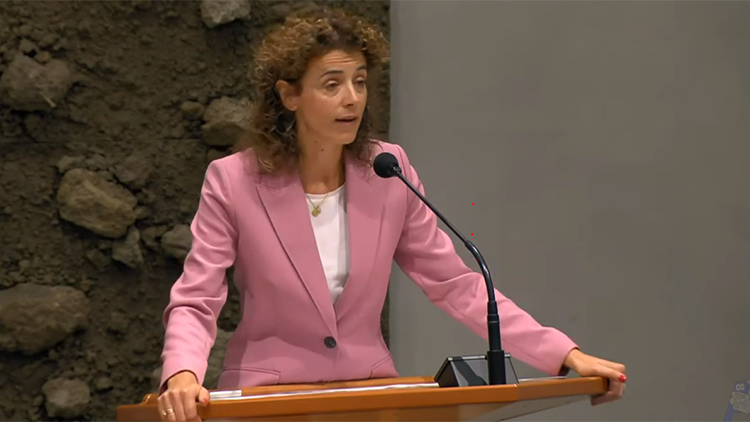National Budget Review
Policymakers talk tough about the number of international students

The debate on the government’s new budget took place in the shadow of the upcoming elections. In fact, the cabinet’s spending plans for next year only played a marginal role in the discussions, which mostly focused on migration and the country’s overall course.
Kicking things off was PVV leader Geert Wilders, who used his time to talk about the ‘foreigners’ flooding our country. “From asylum seekers to migrant workers and foreign students, we’re letting in everyone and their mother. I ask you: what kind of lunatic comes up with this stuff?”
The cabinet resigned over the failure of coalition parties VVD, D66, CDA and ChristenUnie to reach an agreement on the issue of family reunification for refugees. But opinions also differ on labour migration and international students.
University cities
“When we go to university cities, we hear that it’s the growing number of foreign students who are putting pressure on the housing market”, said Mirjam Bikker of ChristenUnie. “We have an intern here: two-thirds of his fellow political science students at the University of Amsterdam are foreign. Is that the direction we want things to go?”
Bikker also took aim at labour migration. After all the big talk from other parties on asylum seekers, Bikker wondered “whether we shouldn’t be just as firm, or perhaps even firmer, on labour migration. At the moment, 30 percent of the income of people coming here from Poland or India is exempt from tax. Isn’t that extremely unfair? The average Dutch citizen doesn’t get that tax break.”
Bikker asked VVD party leader Sophie Hermans what “tough choices” she was willing to make on labour migration and international students. Incidentally, many foreign lecturers working at Dutch higher education institutions also benefit from the tax exemption for migrant workers.
After underlining the importance of migrant workers for large companies, Hermans replied that she did want to take “a number of steps”. She added that she was also quite willing to make changes in higher education. “We could look at the language of tuition at higher education institutions, but also, for example, at introducing enrolment restrictions for certain programmes.”
“I think that’s a step in the right direction”, Bikker replied. “Because frankly, I wonder what this many foreign political science students add to our economy, to put it in VVD terms.” She also repeated her concerns about the consequences for “students looking for somewhere to live”.
Education not mentioned once
Jan Paternotte (D66) said that he would prefer to talk about education itself. “It’s amazing to me that we’ve been debating for five hours and 15 minutes, and that education hasn’t been mentioned once, except for a very brief interjection about political science students. But that didn’t really have much to do with education.”
Only with D66 in the cabinet will there be extra money for education and research, he argued, suggesting that other parties could very well decide to start slashing budgets. “You need a good education to ensure that everyone can make something of their lives”, Paternotte said. “Social security is the safety net; education is the springboard.”
Racism, compensation, security
Education came up at several other points in the debate. Sylvana Simons (BIJ1) wants the education system to devote more attention to slavery and racism. “The immense lack of collective knowledge about the atrocities that have been committed by this country unfortunately leads to more misunderstanding and reinforces hostility towards postcolonial groups”, she said. She argued that this lack of knowledge perpetuates unjust structures. “We see this reflected in our education system itself, where we divide 12-year-old children into different social classes, which they then have to spend the rest of their lives in.”
Throughout the rest of the debate, education was mostly mentioned in passing, when MPs talked about the pressure on ‘care and education’. Forum voor Democratie leader Thierry Baudet briefly touched on higher education in a summary of his election programme. “Not everyone needs to go to university. There should be higher compensation for the unlucky generation who were students between 2015 and 2023 and missed out on the basic student grant. Dutch will be reinstated as the language of instruction in secondary and university education.”
Former Volt MP Nilüfer Gündoğan also called attention to a phenomenon she calls ‘integritism’, where people are falsely accused of compromising social security. She herself was ousted from her party amid accusations of misconduct.
Gündoğan cited a story about a professor as an example. “What had this man done? When he noticed that one of his students had come to class unprepared, he called him out and asked him why he had bothered to show up.” She was referring to a column by Professor Bas van den Putte. “With criminal cases, we explain to victims of sexual abuse that that they can’t report the crime if they’re not willing to testify. But fellow supporters, angry local residents or lazy students can make your life miserable, unchecked.”
Rutte’s response
The National Budget Review will continue with outgoing prime minister Mark Rutte responding to questions from the House of Representatives. Parties can also table motions, which will be voted on late in the evening.